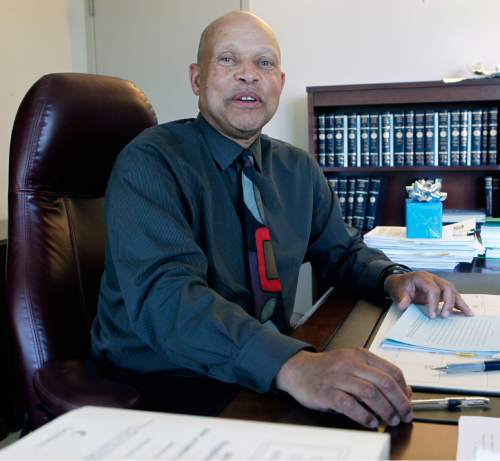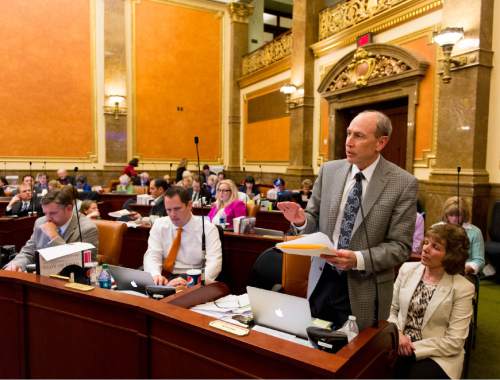This is an archived article that was published on sltrib.com in 2016, and information in the article may be outdated. It is provided only for personal research purposes and may not be reprinted.
There are no black judges on the Utah bench, and there are only four Latinos, four Asians and one American Indian. Nearly three-fourths of the bench is male.
But a Utah lawmaker wants a commission that vets potential judges to stop giving any consideration to racial and gender diversity when it is recommending potential appointees to the governor.
Rep. Merrill Nelson points to the Utah Constitution and state law that he says prohibits the nominating commission from considering race or gender when it vets candidates.
The Grantsville Republican said those laws contradict language on the application for a judgeship that includes a section about "diversity on the bench," which states that if candidates' qualifications are equal, "it is relevant to consider the background and experience of the applicants in relation to the current composition of the bench."
Nelson said that language points to considering race and gender diversity on the bench, which is outside the law.
"It's outside the prescription of the law as provided by the constitution and the statute," said Nelson, who is an attorney and vice chairman of the House Judiciary Committee. "It's stated in our public policy, as reflected in the statute, that all judges should be selected on the basis of qualifications and fitness for office, and race and gender have nothing to do with fitness for office."
But the language is not so clear.
Nelson points to a provision in the Utah Constitution that states that "selection of judges shall be based solely upon considerations of fitness for office," but Nelson leaves out the rest of the sentence, which says, "without regard to any partisan political considerations."
The statute about evaluating judges on their fitness for office lifts the same language from the constitution about politics.
Retired 3rd District Judge Tyrone Medley, the only black judge to serve on the state bench, said he reads that as attempting to preclude partisanship as a factor in evaluating judicial candidates.
"That language is clearly designed to exclude whether or not you are a Republican or Democrat or you were chair of the Democratic or Republican party," Medley said. "It seems to be an attempt to take partisan political considerations out of the equation."
And Medley said there is value in having diversity of all types on the bench.
"Our judicial system relies heavily on the public trust and confidence in the court system," Medley said. If the population diversifies and the courts do not, the judiciary "runs the risk of challenging and eroding public confidence in the court system."
"Along that same line, I think diversity, in fact, enhances the legitimacy of the court system and is consistent with our population following the rule of law," Medley said. "Without it, you have a scenario where, at a minimum, you have a perceived bias in the decision-making process."
Medley, who was appointed to the bench in 1984 by Gov. Norm Bangerter, is the only black person to ever hold a spot in the state court system. (Justice court appointments are controlled by local jurisdictions.) He retired from active-judge status in 2012.
Medley said he was aware of the significance of his position when he served on the bench.
"I wanted to try to do the best possible job I could do, so I could serve as a role model to minority students and other minority members of a population might find some inspiration from me having been successful enough to have a judgeship," Medley said. "I always thought what the position did for me personally and for the community as a whole was emblematic of equal opportunity."
But Nelson said the judiciary is not intended to reflect society, and that issues of racial and gender diversity will work themselves out over time.
"The judiciary was never intended to be representative of society in any way," Nelson said. "The Legislature is the representative branch of government. The judiciary was never intended to be representative. Certainly, over time, the nature of the judiciary will reflect the makeup of society without artificial consideration of race and gender that have nothing to do with fitness for office."
Nelson said that while litigants in a courtroom, whether it's criminal or civil, might feel better having a judge who is their same race or gender, it's impractical to have judges of each race or gender to hear cases involving litigants of the corresponding race or gender.
"Do we say then that all defendants, all litigants have a right to a judge of their own race or gender?" Nelson said. "That's not practical. It's an absurd question. Obviously the answer is no."
Nelson will go to the Legislature's Administrative Rules Review Committee on Thursday to ask the panel to consider forcing the judicial nominating commission, which is under the Commission on Criminal and Juvenile Justice, to remove the diversity language from the judicial application.
"There will be two options, I think, for the committee. The first option will be to remove diversity consideration from the judicial application so that it will be consistent with the constitution and with the statute and with the rules," Nelson said. "Or the alternative would be to amend the constitution, the statutes and the rules to allow for consideration of diversity, and we're talking race and gender diversity."
According to statistics from the Utah Administrative Office of the Courts, there are 111 judges on the state bench, with three vacancies.
Twenty-nine judges are female, four are Latino, four are Asian, one is American Indian and none is black, according to the figures, which are self-reported by the judges and do not include justice courts, which are controlled by local jurisdictions.
Twitter: @RobertGehrke
Pamela Manson contributed to this report





